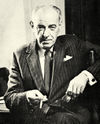The Mischief Makers (novel): Difference between revisions
imported>Hayford Peirce (added a couple more words) |
imported>Hayford Peirce (have finished the lede, and think I can use it as a general template for all the other Haggard books) |
||
| Line 4: | Line 4: | ||
{{Authors|Hayford Peirce|others=y}} | {{Authors|Hayford Peirce|others=y}} | ||
'''The Mischief Makers''' is a 1982 suspense novel by the British author [[William Haggard]] published in England by [[Cassell]] and in the United States by [[Walker and Company]]. It was Haggard's 21st novel involving his protagonist [[Colonel Charles Russell]], who had been been the head of the unobtrusive but lethal Security Executive, a government counter-intelligence agency, for the first 11 books in the series and then is frequently consulted by his various successors during his retirement. Like | '''The Mischief Makers''' is a 1982 suspense novel by the British author [[William Haggard]] published in England by [[Cassell]] and in the United States by [[Walker and Company]]. It was Haggard's 21st novel involving his protagonist [[Colonel Charles Russell]], who had been been the head of the unobtrusive but lethal Security Executive, a government counter-intelligence agency, for the first 11 books in the series and then is frequently consulted by his various successors during his retirement. Like most of the other works by Haggard and some by his near contemporaries [[Victor Canning]] and [[Michael Gilbert]], it is both a standard novel of suspense and a semi-political thriller about the reactions of those in the high government positions who scent potential danger to their own political standing. | ||
==Plot== | ==Plot== | ||
Revision as of 18:08, 20 September 2020
Authors [about]:
join in to develop this article! |
The Mischief Makers is a 1982 suspense novel by the British author William Haggard published in England by Cassell and in the United States by Walker and Company. It was Haggard's 21st novel involving his protagonist Colonel Charles Russell, who had been been the head of the unobtrusive but lethal Security Executive, a government counter-intelligence agency, for the first 11 books in the series and then is frequently consulted by his various successors during his retirement. Like most of the other works by Haggard and some by his near contemporaries Victor Canning and Michael Gilbert, it is both a standard novel of suspense and a semi-political thriller about the reactions of those in the high government positions who scent potential danger to their own political standing.
Plot
Written with Haggard's usual spare, dry, and understated style, etc etc etc
Refers often to the Bristol riot of 1980, which would have happened the previous year in terms of the book, I guess. WP calls this the 1980 St. Pauls riot, with no period after the St.
